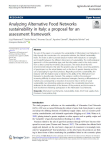Mastronardi L., Marino D., Giaccio V., Giannelli A., Palmieri M., Mazzocchi G. (2019). Analyzing Alternative Food Networks sustainability in Italy: a proposal for an assessment framework. Agricultural and Food Economics, 01/12/2019, vol. 7, p. 1-19.
https://doi.org/10.1186/s40100-019-0142-8
https://doi.org/10.1186/s40100-019-0142-8
| Titre : | Analyzing Alternative Food Networks sustainability in Italy: a proposal for an assessment framework (2019) |
| Auteurs : | L. Mastronardi ; D. Marino ; V. Giaccio ; A. Giannelli ; M. Palmieri ; G. Mazzocchi |
| Type de document : | Article |
| Dans : | Agricultural and Food Economics (vol. 7, December 2019) |
| Article en page(s) : | p. 1-19 |
| Langues : | Anglais |
| Langues du résumé : | Anglais |
| Catégories : |
Catégories principales 08 - ALIMENTATION ; 8.1 - Consommation Alimentaire. ComportementThésaurus IAMM ALIMENTATION DURABLE ; SYSTEME ALIMENTAIRE ALTERNATIF ; CHAINE D'APPROVISIONNEMENT ; CIRCUIT COURT ; POLITIQUE ALIMENTAIRE ; PRODUCTION ALIMENTAIRE ; INDICATEUR COMPOSITE ; INDICATEUR ENVIRONNEMENTAL ; INDICATEUR ECONOMIQUE ; INDICATEUR SOCIAL ; ITALIE |
| Résumé : | The aim of the paper is to evaluate the sustainability of Alternative Food Networks in Italy through the construction of a composite indicator, the Global Sustainability Index. The index is able to provide decision-makers with indications on synergies and tradeoffs between the different dimensions of sustainability. The methodological approach is of the quantitative type, and the information used in the study comes from a direct survey that involved 226 producers. The results show that the environmental indicators that take the greatest value are those concerning problems of great impact on the actual debate such as the loss of genetic diversity and the use of packaging for agro-food products. Regarding economic sustainability, the indicator with the highest value is related to the ability of the Alternative Food Networks to diversify sales channels. This evidence confirms the producers’ increasing difficulty to adopt mono-directional strategies, favoring a differentiation of markets and, consequently, a reduction of economic risks. In terms of social sustainability, two interesting evidences emerge: the considerable importance attributed to the information of the features of the products and the increase in work involvement following participation in the Alternative Food Networks. |
| Cote : | En ligne |
| URL / DOI : | https://doi.org/10.1186/s40100-019-0142-8 |







